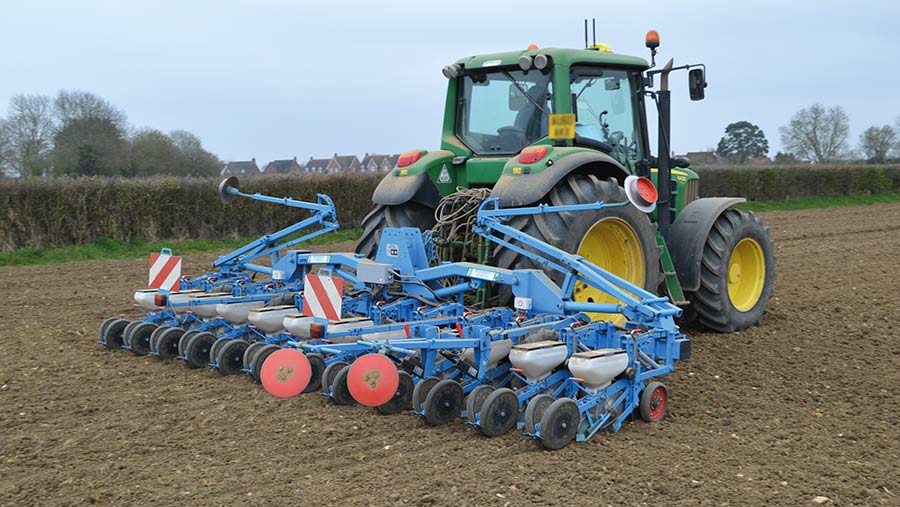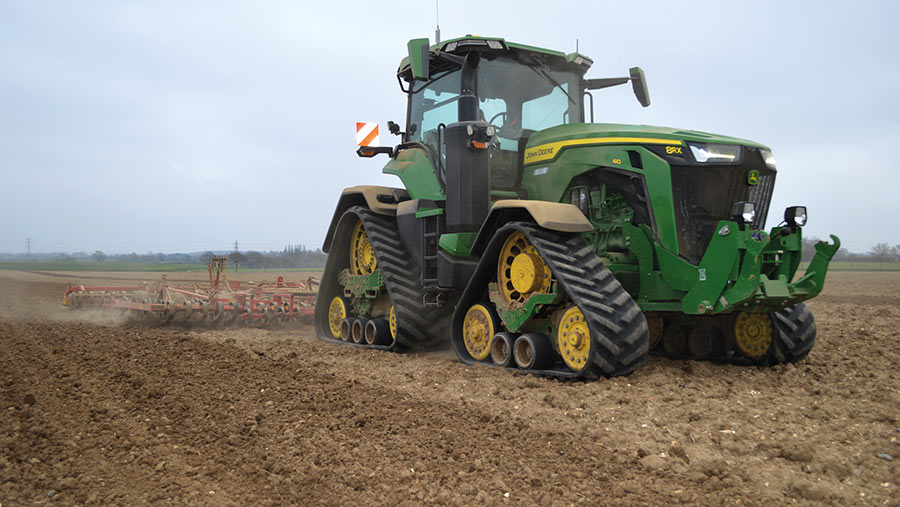Video: Sugar beet drilling success with near-perfect weather
 © MAG/David Jones
© MAG/David Jones Sugar beet drilling is racing to a close in the current dry weather with higher beet prices and the availability of a key virus yellows seed treatment prompting more optimism among beet growers and the processing industry.
Suffolk grower Will Hitchcock is more upbeat on the crop’s prospects after good beet yields last season and as this spring’s crop is going into generally good dry seed-beds with plenty of moisture down below.
Watch the video of the Hitchcock Farm’s sugar beet drilling, hear from Will on the conditions and from British Sugar on this year’s drilling campaign, and read the full report below.
See also: 3 factors growers can influence to maximise sugar beet yields
Will farms with his father Guy, mother Liz and sister Katherine just south of Stowmarket, and virtually all of the 600ha of beet that the family drills each year on their farm and on contract work was in the ground by the end of March.
“The beet price recovery is useful as every pound is welcome, but fuel prices are up and spray costs will be up a bit too,” he tells Farmers Weekly. The farm has two contracts which look to supply 16,000 tonnes of beet annually.

© Katherine and Will Hitchcock © MAG/David Jones
Beet price rise
British Sugar has increased its beet price for this season by 33% to £27/t for one-year deals and also by 27% for multi-year deals to the same price of £27/t, while neonicotinoid insecticide seed treatments can be used this year to protect against virus yellows infections.
The family business Hitchcock Farms is based at Chapel Farm, in the village of Ringshall, covering 800ha of largely heavy clay loams growing 200ha of sugar beet, up from 180ha last season, largely for rotation reasons, with a further 400ha drilled on contract.
Beet yields on the home farm averaged an impressive 96t/ha in 2021, ranging from 75t/ha for early-lifted crops to 113t/ha on a mid-January 2022 harvested crop, and were well above the virus yellows-hit crop in 2020, which averaged a yield of just 75-80t/ha.
Drilling progress has been rapid this spring, helped by the dry weather. Virtually all the 600ha of beet was sown in the last two weeks of March, using two 6m-width Monosem precision seed drills operating around the clock.

© MAG/David Jones
The farm favours this drill with its disc openers followed by a standard tungsten coulter, as it can cope with a range of soil types from light sands towards the Suffolk coast to heavier soils on the home farm.
The 6m drills work on 50cm row widths, with seed placed along the rows at 16cm gaps to aim for 100,000 plants/ha. The French-based precision drill maker was bought by John Deere in 2015.
“The disc opener helps open the land up and works especially well on our heavier land,” says Mr Hitchcock.
Drilling conditions

© MAG/David Jones
He describes seed-bed conditions as generally good, but they would have been better with more heavy winter frosts to give more weathering of their heavier soils.
Beet land is usually ploughed, prepared with a tine-roller combination before the winter and then a spring tine-roller combination is used just before drilling.
The threat of aphid-borne virus yellows disease this season has triggered the use of neonicotinoid seed dressings if growers request them, as generally warm winter weather has encouraged high aphid numbers.
Despite the green light for the emergency temporary use of this seed treatment, Mr Hitchcock has only drilled about 15% of the family farm’s beet area with the neonicotinoid Cruiser (thiamethoxam), due to rotational considerations.
Neonicotinoid seed treatments were banned in sugar beet in 2018 due to concerns that they may kill bees and other pollinations, and were not used in the springs of 2019, 2020 and 2021.
Heavy infestations of virus-carrying peach-potato aphids (myzus persicae) occurred in 2020, leading to a sharp 25% fall in national beet yields.
The main four-year rotation on the farm is sugar beet-winter wheat-oilseed rape/winter bean-winter wheat, and if neonicotinoid seed treatments are used then no flowering crops can be grown in the next 32 months after the beet is drilled.
This would preclude flowering crops such as oilseed rape and beans.
This 32-month delay for all flowering crops was put in place to allow for the reduction in the concentration of thiamethoxam and its breakdown product clothianidin in the soil and in any subsequent flowering crops.
Neonic go-ahead
British Sugar only got the go-ahead on March 1 from a Rothamsted modelling survey for the use of neonicotinoids.
This showed that 69% of sugar beet would be infected with virus yellows in the absence of any treatment, way ahead of the trigger point of 19% and close to the 85% level in the very bad virus yellows year of 2020.
Nick Morris, head of central agricultural at British Sugar, says that neonicotinoid seed treatments should give 10 weeks of protection.
This would take the crop up to the 12-leaf stage in early June when plants become more resistant to aphids, although growers should be monitoring crops in the spring for aphid numbers.
He added that about 70% of sugar beet seed has been given a neonicotinoid treatment this season in the narrow window between the Rothamsted survey release and the normal start of drilling from mid-March onwards.
Growers will still have the use of two foliar sprays other than neonicotinoid seed treatments to prevent virus yellows – that is one application of Teppeki (flonicamid) and one of InSyst (acetamiprid) – so only two foliar sprays in total for the season.
Growing costs for England’s 3,000-plus sugar beet growers are likely to rise this season, with British Sugar saying a typical pesticide regime using herbicides, fungicides and insecticides will have risen in price by about 7% this season.
This is without taking into account the sharp rise in nitrogen fertiliser prices.
Mr Morris forecasts that the sugar beet area is set to be about the same as that drilled in spring 2021, at about 91,000ha.
UK sugar beet harvests |
|||
| Year | White sugar production | Average beet yield | Sugar beet area |
| 2019 | 1.19m tonnes | 80.65t/ha | 100,000ha |
| 2020 | 900,000 tonnes | 59.15t/ha | 103,000ha |
| 2021 | 1.05m tonnes | about 80t/ha | 91,000ha |
| 2022 | n/a | n/a | about 91,000ha |
